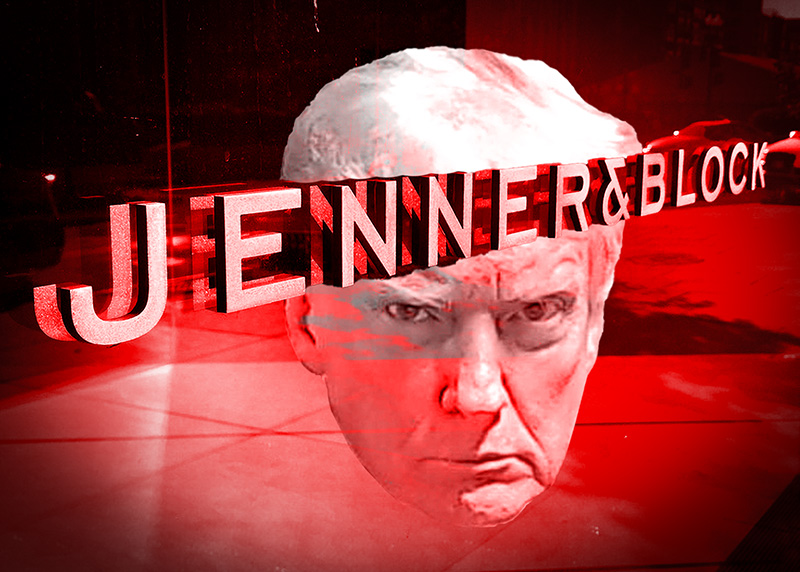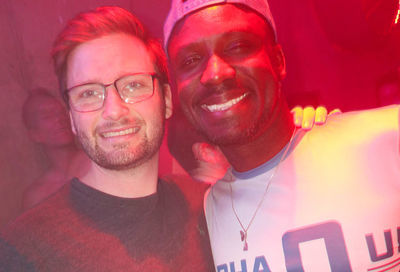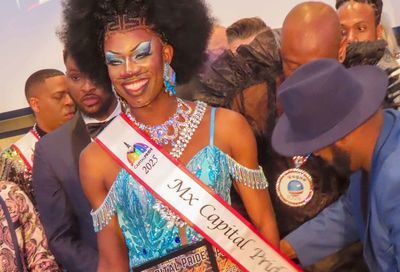Buttigieg draws fire from other Democrats in PBS debate
For the first time, moderators pose question on anti-transgender violence to Democratic candidates

Former South Bend Mayor Pete Buttigieg came under attack from his fellow Democrats during Wednesday night’s presidential debate on PBS, particularly Sen. Elizabeth Warren, who took issue with Buttigieg’s decision to attend high-priced fundraisers with wealthy donors.
Buttigieg’s supporters pointed to the attacks against him as evidence that other candidates, namely, Massachusetts Sen. Elizabeth Warren, see him as a threat to their own prospects in the crowded Democratic field. But even with only seven candidates on stage at Los Angeles’ Loyola Marymount University, Buttigieg, the first openly gay Democrat to seek the presidency, took his fair share of criticism.
Warren was the chief agitator when it came to that front, blasting Buttigieg for a recent closed-door fundraiser at a California winery, which featured a “wine cave” with a chandelier made up of 1,500 Swarovski crystals, using it to try and cast him as too cozy with wealthy elites and implying that he is trading access or plum positions in a potential Buttigieg administration in exchange for financial support.
“We made the decision many years ago that rich people in smoke-filled rooms would not pick the next president of the United States,” Warren said, landing the first blow. “Billionaires in wine caves should not pick the next president of the United States.”
But Buttigieg returned fire, noting that he was the only one of the seven candidates on the debate stage who is not considered a millionaire, noting that even Warren, for all her posturing, anti-billionaire rhetoric, and appeals to the Democratic Party’s left wing, has benefitted from raising money at traditional fundraisers for her Senate campaign and transferring that money to her presidential campaign.
“According to Forbes magazine, I am literally the only person on this stage who’s not a millionaire or billionaire,” he said to subdued applause from the audience. “This is the problem with issuing purity tests you cannot yourself pass.”
Warren parried, saying: “If you can’t stand up and take the steps that are relatively easy, can’t stand up to the wealthy and well-connected when it’s relatively easy when you are a candidate, then how can the American people believe you’re going to stand up to the wealthy and well-connected when you’re president and it’s really hard?”
But Buttigieg pushed back against the concept — regurgitated on social media by left-wing activists — that anyone who accepts money from rich donors, even Democratic ones, would simply let them influence policy decisions because of their financial support.
“If you can’t say ‘No’ to a donor, then you have no business running in the first place,” Buttigieg said. “Did it corrupt you, Senator? Of course not. So to denounce the same kind of fundraising guidelines that President Obama went by, that [House] Speaker [Nancy] Pelosi goes by, that you yourself went by until not long ago, in order to build the Democratic Party and build a campaign ready for the fight of our lives, these purity tests shrink the stakes of the most important election.”
Buttigieg also parried attacks from Sen. Amy Klobuchar of Minnesota, who attacked the South Bend mayor for seeming to belittle experience in Washington in order to cast himself as the “outside the Beltway” candidate in the race.
“When we were in the last debate, Mayor, you basically mocked the hundred years of experience on the stage,” Klobuchar said, noting Warren’s establishment of the Consumer Financial Protection Bureau, former Vice President Joe Biden’s work funding cancer research, Vermont Sen. Bernie Sanders’ legislative efforts to help veterans, and her success in passing three farm bills.
Buttigieg argued that Klobuchar had previously “denigrated” his experience as a mayor, but said he was going to let it go because “we have bigger fish to fry.”

As the back-and-forth continued between the two, Klobuchar also attacked Buttigieg for failing to demonstrate that he had the ability to win over moderate Republicans and independents — a key argument he makes on the campaign trail — while she has demonstrated she can win widespread support in a swing state, even winning a reliably Republican district that once was represented by former U.S. Rep. Michele Bachmann (R), a staunch conservative and former presidential candidate.
Buttigieg countered, arguing that his re-election as mayor of South Bend demonstrated that.
“If you want to talk about the capacity to win, try putting together a coalition to bring you back to office with 80 percent of the vote as a gay dude in Mike Pence’s Indiana,” he said.
But Klobuchar pushed back, referencing the mayor’s failed 2010 bid for state treasurer, saying: “If you had won in Indiana, that would be one thing. You tried, and you lost by 20 points.”
Democrats also sparred over health care and the benefits or detriments of Sanders’ “Medicare for All” proposal, foreign policy and how much of a military presence to keep in Afghanistan, and, in a first, revealed heretofore unexamined differences between them when it comes to incorporating nuclear power into their plans for transitioning away from traditional fossil fuels in an effort to combat climate change, or relocating residents from coastal cities or towns that have become uninhabitable due to sea-level rise.
All seven candidates agreed with the recent impeachment of President Trump — making him only the third sitting president in history to be impeached — but businessman Andrew Yang warned that Democrats should recognize that Trump is a symptom of underlying problems and a growing unrest among the country’s populace.
“What we have to do is we have to stop being obsessed over impeachment…and start actually digging in and solving the problems that got Donald Trump elected in the first place,” Yang said. “The more we act like Donald Trump is the cause of all our problems, the more Americans lose trust that we can actually see what’s going on in our communities and solve those problems.”
Related: Democratic debate ignores anti-trans violence on Transgender Day of Remembrance
In another first, moderators leveled a question specifically about anti-transgender violence and other steps, beyond passage of the Equality Act, that Democrats need to take to better protect the community.
Sanders talked of the importance of having a president that will stand up for all Americans and providing a “moral example” for how to treat people, pivoting back to his message of the importance of universal health care for all people — a topic on which the Vermont senator feels much more comfortable.
Warren promised that if elected, she would go to the Rose Garden once a year to read the names of transgender women whose lives were claimed by violence that year, so that the nation would be “forced to address” circumstances that make transgender individuals particularly vulnerable to violence, discrimination, or homelessness. She also vowed to change rules that house transgender inmates based on their assigned sex at birth, but declined to explain why that was important. She vowed to ensure that “we are an America that leaves no one behind.”
LGBTQ advocates noted that by introducing the question on transgender people, the PBS moderators reversed a trend where no questions on LGBTQ-specific issues have been asked during a major debate (though there have been two separate forums specifically focusing on LGBTQ concerns). Those same advocates have argued that, particularly since Republicans have signaled that they intend to use transgender rights as a wedge issue, Democrats must be ready to defend transgender Americans and lay out a vision for inclusion.
Republicans have particularly focused their attacks on the threat that transgender female athletes pose to Title IX and cisgender girls’ ability to succeed in sports, based on polling showing that a majority of Americans don’t support allowing trans athletes to compete based on the gender with which they identify. Similar attacks have been utilized in recent elections in Kentucky, Louisiana, Mississippi and Virginia, and President Trump’s son has railed against transgender athletes in what many see as an attempt to court the Republican Party’s socially conservative base and keep them engaged as the president seeks re-election.
Related: Bill targeting transgender student-athletes dies in Texas House
“With anti-LGBTQ activists planning an onslaught of false ads against LGBTQ Americans next year, it is important now more than ever for the candidates to proactively speak out against anti-LGBTQ discrimination, and tonight’s debate did just that,” Sarah Kate Ellis, the president and CEO of the media advocacy group GLAAD, said in a statement. “LGBTQ voters need to know that they have a true ally with the next president — and tonight’s question about violence against transgender Americans rightfully brought to light an epidemic that continues to cripple the LGBTQ community, with 2019 being named the deadliest year on record for the trans community.”
Human Rights Campaign President Alphonso David also acknowledged the importance of raising LGBTQ issues in a major presidential debate.
“We are in a moment of crisis: our trans siblings are facing disproportionate levels of violence and are being targeted simply because of who they are,” he said in a statement. “Now, more than ever, it is vital that our voices are heard and that the candidates are able to address our community directly.
“There are 57 million Equality Voters across the country — voters who have been waiting to hear from the candidates on our priority issues,” added David. “This moment, and the eagerness of the candidates to engage on this issue, shows that LGBTQ people and our allies will be a crucial part of a winning coalition in 2020.”
Read more:
Virginia’s incoming House Speaker promises to pass LGBTQ protections in 2020
Petition to ban Netflix comedy featuring gay Jesus gains more than 2 million signatures
Washington man accused of killing teen after learning she was transgender
Support Metro Weekly’s Journalism
These are challenging times for news organizations. And yet it’s crucial we stay active and provide vital resources and information to both our local readers and the world. So won’t you please take a moment and consider supporting Metro Weekly with a membership? For as little as $5 a month, you can help ensure Metro Weekly magazine and MetroWeekly.com remain free, viable resources as we provide the best, most diverse, culturally-resonant LGBTQ coverage in both the D.C. region and around the world. Memberships come with exclusive perks and discounts, your own personal digital delivery of each week’s magazine (and an archive), access to our Member's Lounge when it launches this fall, and exclusive members-only items like Metro Weekly Membership Mugs and Tote Bags! Check out all our membership levels here and please join us today!


























You must be logged in to post a comment.